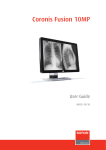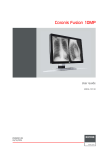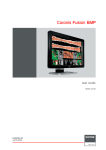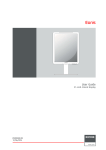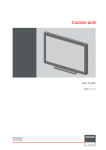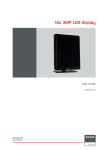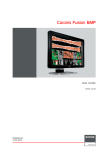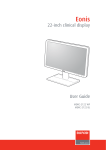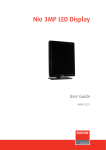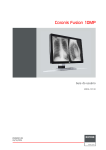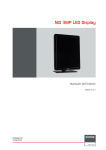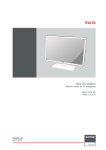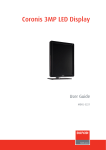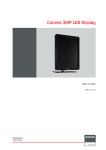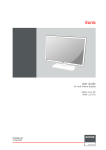Download Barco Coronis 5MP
Transcript
Coronis 5MP User Guide MDCG-5121 B4100592/03 05/08/2014 Barco nv President Kennedypark 35, 8500 Kortrijk, Belgium Phone: +32 56.23.32.11 Fax: +32 56.26.22.62 Support: www.barco.com/esupport Visit us at the web: www.barco.com Printed in Belgium 1. Welcome! 1. WELCOME! 1.1 About the product Overview The high-grade Coronis 5MP display system offers unsurpassed film-like images with ultra-high resolution, luminance and contrast . The 21.3” LCD provides unequaled image quality without pixelization, a wide viewing angle and perfect geometry. Building on proven technology, Coronis 5MP provides ultimate precision and performance while maintaining the highest brightness and contrast. The advanced 10-bit architecture ensures accurate image representations with 1024 simultaneous shades of gray out of a palette of 4096. CAUTION: Read all the important safety information before installing and operating your Coronis 5MP. Please refer to the dedicated chapter in this user guide. 1.2 What’s in the box Overview Your Coronis 5MP comes with: • • • • • • • • • the display a system tilt and swivel foot this Coronis 5MP user guide a system CD a DisplayPort cable a DVI cable an USB cable an AC power cord an external power supply If you ordered a Barco display controller, it’s also in the box together with its accessories. A dedicated user guide is available on the system CD. Keep your original packaging. It is designed for this display and is the ideal protection during transport and storage. B4100592 CORONIS 5MP 05/08/2014 1 1. Welcome! 2 B4100592 CORONIS 5MP 05/08/2014 2. Parts, controls and connectors 2. PARTS, CONTROLS AND CONNECTORS 2.1 Display front view Overview 7 1 2 3 4 5 6 Image 2-1 Front view 1 I-Luminate/Left key 2 Right key 3 Menu key 4 Power on/off key 5 Ambient light sensor 6 Power LEDs 7 Side downstream USB 2 & 3 B4100592 CORONIS 5MP 05/08/2014 3 2. Parts, controls and connectors 2.2 Display rear view Connector compartment cover closed 4 1 2 3 Image 2-2 Rear view cover closed 1 Connector compartment cover 2 Display release button for portrait position 3 Mounting anchor 4 Display release button for landscape position Connector compartment cover open 5 7 6 9 8 11 10 Image 2-3 Rear view cover open 4 5 24 Vdc power input 6 +5 Vdc, 0.5 A power output 7 Display Port video input 8 DVI video input 9 Ethernet connection (see note below) 10 USB upstream 11 USB downstream 1 B4100592 CORONIS 5MP 05/08/2014 2. Parts, controls and connectors The Ethernet connection is used for maintenance purposes and is not supported for user application. 2.3 Foot Single foot 1 2 Image 2-4 1 Tilt & Swivel neck cover 2 Cable duct covers Dual foot 4 2 2 1 3 Image 2-5 Dual tilt and swivel foot 1 Cable cover 2 Left & right arm cover 3 Foot lock clip (behind cable cover) 4 Display positioning sliders B4100592 CORONIS 5MP 05/08/2014 5 2. Parts, controls and connectors 6 B4100592 CORONIS 5MP 05/08/2014 3. Display installation 3. DISPLAY INSTALLATION Prior to installing your Coronis 5MP and connecting all necessary cables, make sure to have a suitable display controller physically installed in your computer. If you are using a Barco display controller, please consult the user guide delivered with it to do this. 3.1 Mounting the displays WARNING: Do not change the display orientation by turning the panel when it is mounted on its stand. To change from landscape to portrait or the other way around, remove the panel from its stand and use the appropriate mounting hooks as described above. Using the single tilt & swivel foot (portrait orientation) 1. Unpack the single tilt & swivel foot and place it on a solid surface. 2. Unpack the display. 1 3 2 3. Hook the top gaps in the rear of the panel over the top anchors of the stand attachment plate (1). 4. Push the bottom of the panel firmly towards the stand so that the bottom anchors clip in the bottom gaps (2). 5. Check that the panel is firmly attached to the stand. 6. Tilt and swivel the panel to the desired position and angle. B4100592 CORONIS 5MP 05/08/2014 7 3. Display installation Using the single tilt & swivel foot (landscape orientation) 1. Follow the same steps as for the portrait installation but hold the display in landscape position to hook the panel on the foot. 1 3 2 To release the panel from the display foot: 1. Push the push-button (3) at the rear of the panel. 8 B4100592 CORONIS 5MP 05/08/2014 3. Display installation 1 3 2 2. Pull the bottom of the panel towards you and at the same time lift the panel from the stand attachment plate. Using the dual tilt & swivel foot 1. Unpack the dual tilt & swivel foot and place it on a solid surface. 2. Unpack the first display. B4100592 CORONIS 5MP 05/08/2014 9 3. Display installation 1 2 3. Hold the display slightly angled with the logo downwards and position the top of the mounting anchor, at the back of the display, perfectly aligned on the top of the mounting clamp of the foot. 4. Push the downside of the display gently backwards until the mounting clamp locks into the mounting anchor. 5. Verify that mounting clamp and mounting anchor are perfectly fitting and that the display is firmly mounted. 6. Repeat step 2 to 5 for the second display. Caution: Limit transportation distances of the mounted displays and foot system. 7. Pull out the foot lock clip. 8. Retain the clip for possible further transportations. 9. Now that the height-positioning is unlocked, you can adjust the position of the displays. 10 B4100592 CORONIS 5MP 05/08/2014 3. Display installation Note: When both displays are not correctly aligned, minor corrections are possible in relative height and relative angle, by loosening and tightening the opposite pairs of allen screws (opposite sides or opposite diagonals) of the positioning sliders. 3.2 VESA-mount installation The display mounting anchor is compatible with the VESA 100 mm standard. WARNING: Never move a display attached to an arm by pulling or pushing the display itself. Instead, make sure that the arm is equipped with a VESA approved handle and use this to move the display. Please refer to the instruction manual of the arm for more information and instructions. WARNING: Use an arm that is approved by VESA (according to the VESA 100 mm standard). Use an arm that can support the weight of the display. Refer to the technical specifications of this display for the applicable weight. Overview The display mounting anchor is compatible with the VESA 100 mm standard. 1. Unscrew the four fixation screws in the mounting anchor. B4100592 CORONIS 5MP 05/08/2014 11 3. Display installation 2. Attach the display firmly to the VESA mounting bracket with 4 screws M4 x 10 mm. You should mount the display in portrait position. Landscape position is not supported. 3.3 Removing the covers Removal of the connector compartment cover The connector compartment cover should be removed to get access to the connectors. To remove the connector compartment cover, proceed as follows: 1. Gently push the two lips on top of the cover. 2. Pull the top of the cover slightly away from the display and lift the cover upwards. 1 2 Removal of the cable covers of a single foot To get access to the cable routing channel of a single foot, the cable covers should be removed. To remove them, proceed as follows: 1. Remove the tilt & swivel neck cover (1). Therefore, first tilt the display panel in upright position. Then lift and pull backward the neck cover. 2. Also to facilitate cable routing afterwards, open both cable duct covers (2). 12 B4100592 CORONIS 5MP 05/08/2014 3. Display installation 1 2 2 Removal of the cable cover of a dual foot To get access to the cable routing channel of a dual foot, the display stand cable cover should be removed. To remove this cover, proceed as follows: 1. Gently press and hold the lock clips at the inside of the top of the cover. 2. Slide the cover upwards on the shaft while holding the clips pressed. It may be needed to tilt the displays if the arm is blocking the movement of the cover. 1 2 3.4 Connecting the signal cables CAUTION: Only connect one of the two video links. Connecting both inputs simultaneously will result in driver errors. B4100592 CORONIS 5MP 05/08/2014 13 3. Display installation To connect the signal cables to the display: You may connect the display to a display controller by using the DVI or the DP connection. The active input can be selected in the OSD menu. 1. Connect the DVI or DP of the display controller to the DVI or DP connector of the display. 2. If you want to make use of the display’s USB downstream connectors, connect a PC USB downstream connector to the display’s USB upstream connector. 3. If you have chosen to use the display’s USB downstream connectors, connect a USB device to one of the downstream connectors. 4. Connect the supplied external DC power supply to the +24 VDC power input of the display. 14 B4100592 CORONIS 5MP 05/08/2014 3. Display installation 5. Plug the mains connector of the external DC power supply to a grounded power outlet by means of the supplied power cable. 3.5 Routing the cables To route the cables 1. Route the cables alongside the neck and in the cable ducts in the tilt & swivel foot. 2. Re-attach the connector compartment cover and neck cover. Close the cable duct covers. Push the cable duct covers upwards to lock them. To route the cables on a dual foot If the display is mounted on the system dual tilt & swivel foot, cables are best routed behind the arms and through the cable channel in the foot shaft, as shown in the pictures below. B4100592 CORONIS 5MP 05/08/2014 15 3. Display installation 3.6 First time starting up Overview You are now ready to start up your Coronis 5MP for the first time. 1. Switch on your Coronis 5MP as described in "Standby switching", page 18. 2. Turn on the computer connected to your display. If you have properly installed your display and display controller, the Windows start-up messages will appear once the boot procedure is finished. Your Coronis 5MP will be running in a basic video mode at a default refresh rate when first time starting up. If you are using a Barco display controller, please consult the user guide delivered with it to install the drivers, software and documentation. When this is done, your display will automatically detect the connected video input signal(s) and apply the correct video mode and refresh rate. 16 B4100592 CORONIS 5MP 05/08/2014 4. Daily operation 4. DAILY OPERATION 4.1 Recommendations for daily operation Optimize the lifetime of your display Enabling the Display Power Management System (DPMS) of your display will optimize its diagnostic lifetime by automatically switching off the backlight when the display is not used for a specified period of time. By default, DPMS is enabled on your display, but it also needs to be activated on your workstation. To do this, go to “Power Options Properties” in the “Control Panel”. Barco recommends setting DPMS activation after 20 minutes of non-usage. Use a screen saver to avoid image retention Prolonged operation of an LCD with the same content on the same screen area may result in a form of image retention. You can avoid or significantly reduce the occurrence of this phenomenon by using a screen saver. You can activate a screen saver in the “Display properties” window of your workstation. Barco recommends setting screen saver activation after 5 minutes of non-usage. A good screen saver displays moving content. In case you are working with the same image or an application with static image elements for several hours continuously (so that the screen saver is not activated), change the image content regularly to avoid image retention of the static elements. Understand pixel technology LCD displays use technology based on pixels. As a normal tolerance in the manufacturing of the LCD, a limited number of these pixels may remain either dark or permanently lit, without affecting the diagnostic performance of the product. To ensure optimal product quality, Barco applies strict selection criteria for its LCD panels. To learn more about LCD technology and missing pixels, consult the dedicated white papers available at www.barco.com/healthcare. Enhance user comfort Every Barco multi-head display system is color matched with the highest specifications in the market. Barco recommends keeping color-matched displays together. Furthermore, it is important to use all displays of a multi-head configuration at the same rate to preserve color matching throughout the economic lifetime of the system. B4100592 CORONIS 5MP 05/08/2014 17 4. Daily operation Maximize quality assurance The ’MediCal QAWeb’ system offers online service for high-grade Quality Assurance, providing maximum diagnostic confidence and uptime. Barco recommends to install MediCal QAWeb Agent and apply the default QAWeb policy at least. This policy includes calibration on regular intervals. Connecting to MediCal QAWeb Server offers even more possibilities. Learn more and sign up for the free MediCal QAWeb Essential level at www.barco.com/healthcare/qa. 4.2 Key indicator lights About the key indicator lights By default, the indicator lights of the keys will be dimmed which makes the keys unavailable at that moment. To make the keys illuminate and available for further actions touch one of the keys. As a result, all keys will be illuminated and are now available for further actions. However, if no further actions are taken within the following 5 seconds, the keys will dim again. The key auto-dim function can be disabled in the OSD menus. Please refer to "Key indicator lights", page 22 for detailed instructions on how to do this. 4.3 Standby switching About standby switching The connected power supply also provides a switch that can be used to turn the power completely off. To use the display, please make sure to switch on this power supply. This can be done by pushing the on/off switch on the power supply into the “│” position. Switching on the display while it is in standby mode or vice versa can be done by: 1. Illuminate the keys as previously described. 2. While the keys are illuminated, touch the standby key for approximately 2 seconds. As a result, the display will switch on or will switch to standby mode. When the display is switched on, the power LED is blue. When the display is in standby mode, the power LED is orange. The power LED can be disabled in the OSD menus. Please refer to "Power status indicator light", page 22 for detailed instructions on how to do this. 18 B4100592 CORONIS 5MP 05/08/2014 4. Daily operation In case of a power outage recovery, your display will always start-up in the power mode it was in before the power interruption (i.e. standby or on). This protects your display against inadvertent image retention problems. 4.4 Bringing up the OSD menus How to bring up the OSD menus The OSD menu allows you to configure different settings to make your Coronis 5MP fit your needs within your working environment. Also, you can retrieve general information about your display and its current configuration settings through the OSD menu. Bringing up the OSD menus can be done by: 1. If not already done so, switch on the display as previously described. 2. Illuminate the keys as previously described. 3. While the keys are illuminated, touch the menu key. As a result, the OSD main menu comes up in the center of the screen. However, if no further actions are taken within the following 90 seconds, the OSD will disappear again. The OSD menu auto-exit function can be disabled in the OSD menu. Please refer to "OSD menu automatic close function", page 21 for detailed instructions on how to do this. The OSD menu position can be modified in the OSD menu. Please refer to "OSD menu position", page 21 for detailed instructions on how to do this. 4.5 Navigating through the OSD menus How to navigate through the OSD menus Navigating through the OSD menus can be done by: • • • • Use the up/down keys to move through the (sub)menus, change values or make selections. To go into a submenu or confirm adjustments and selections, use the menu key. Us the standby key to cancel adjustments or exit a (sub)menu. Exit all OSD menus at once by touching the standby key for approximately 2 seconds. B4100592 CORONIS 5MP 05/08/2014 19 4. Daily operation 20 B4100592 CORONIS 5MP 05/08/2014 5. Advanced operation 5. ADVANCED OPERATION 5.1 OSD menu position About the OSD menu position By default, the OSD menu comes up in the bottom center position of the screen. This position can be modified however. There’s choice from a number of predefined positions. To change the position of the OSD menu: 1. Bring up the OSD main menu. 2. Navigate to the Configuration > User Interface > Menu menu. 3. Enter the Position submenu. 4. Select one of the available OSD menu positions and confirm. 5.2 OSD menu language About the OSD menu language By default, the OSD menu comes up in English. However, there’s a wide range of other languages available for the OSD menu of your Coronis 5MP. To change the language of the OSD menu: 1. Bring up the OSD main menu. 2. Navigate to the Configuration > User Interface menu. 3. Enter the Language submenu. 4. Select one of the available languages and confirm. 5.3 OSD menu automatic close function About the OSD menu automatic close function By default, the OSD menu will disappear automatically after approximately 90 seconds of inactivity. However, this function can be disabled so that the OSD menu remains on the screen until manually closed. To enable/disable the OSD menu automatic close function: 1. Bring up the OSD main menu. 2. Navigate to the Configuration > User Interface > Menu menu. 3. Enter the Automatic Close submenu. 4. Select Enabled/Disabled as desired and confirm. B4100592 CORONIS 5MP 05/08/2014 21 5. Advanced operation 5.4 Power status indicator light About the power status indicator light By default, when the display is switched on, the power status indicator light is dimmed. This behavior can be changed so that the power status indicator light will be blue when the display is switched on. When the display is in stand-by mode, the power status indicator light will always turn orange, even when the power status indicator light is disabled. To enable/disable the power status indicator light: 1. Bring up the OSD main menu. 2. Navigate to the Configuration > User Interface > Indicator Lights menu. 3. Enter the Power Status submenu. 4. Select Enabled/Disabled as desired and confirm. 5.5 Key indicator lights About the key indicator lights By default, after lighting up, the key indicator lights will dim again if no further actions are taken within the following 5 seconds. However, this behavior can be changed so that the key indicator lights are always on or always off. To configure the key indicator lights 1. Bring up the OSD main menu. 2. Navigate to the Configuration > User Interface > Indicator Lights menu. 3. Enter the Keys submenu. 4. Select Automatic/Always On/Always Off as desired and confirm. 5.6 Power lock function About the power lock function By enabling the power lock function, the Coronis 5MP is forced to remain switched on. This means that it can’t be switched to stand-by mode until the power lock function is disabled again. To enable/disable the power lock function: 1. Bring up the OSD main menu. 2. Navigate to the Configuration > User Interface > Controls menu. 3. Enter the Power Lock submenu. 4. Select Enabled/Disabled as desired and confirm. 22 B4100592 CORONIS 5MP 05/08/2014 5. Advanced operation 5.7 Keys sound About keys sound By default, the keys will make a “beep” sound on every touch. However, this sound can be disabled so that no sound will be heard when using the keys. To enable/disable the keys sound: 1. Bring up the OSD main menu. 2. Navigate to the Configuration > User Interface > Controls menu. 3. Enter the Sound submenu. 4. Select Enabled/Disabled as desired and confirm. 5.8 Ethernet over USB About Eth. over USB By default, the Ethernet over USB will be disabled. This does not disable the USB hub and still allows to make use of the display’s USB downstream connectors and any external devices connected to it (keyboard, mouse, ...). Please note that a connection from a PC USB downstream connector to the display’s USB upstream connector is required to be able to use this functionality. By enabling the Ethernet over USB, you allow the internal Coronis 5MP processor to communicate directly over USB with the connected PC. Enabling the Ethernet over USB is only recommended when you are using a non-Barco display controller. If you are using a Barco display controller, this communication will automatically be done over the connected video cable(s). To enable/disable the eth. over USB: 1. Bring up the OSD main menu. 2. Navigate to the Configuration > Connectivity menu. 3. Enter the Eth. over USB submenu. 4. Select Enabled/Disabled as desired and confirm. 5.9 USB About USB By default, USB will be enabled. This will allow the connected PC to communicate directly over USB with the internal Coronis 5MP processor. By disabling USB, communication between the internal Coronis 5MP processor and the connected PC will not be possible. This does not disable the USB hub and still allows to make use of the display’s USB downstream connectors and any external devices connected to it (keyboard, mouse, ...). Please note that a connection from a PC USB downstream connector to the display’s USB upstream connector is required to be able to use this functionality. B4100592 CORONIS 5MP 05/08/2014 23 5. Advanced operation Enabling the USB endpoint is only recommended when you are using a non-Barco display controller. If you are using a Barco display controller, this communication will automatically be done over the connected video cable(s). To enable/disable USB: 1. Bring up the OSD main menu. 2. Navigate to the Configuration > Connectivity menu. 3. Enter the USB submenu. 4. Select Enabled/Disabled as desired and confirm. 5.10 DPMS mode About DPMS mode Enabling the Display Power Management System (DPMS) mode on your display will optimize its diagnostic lifetime by automatically switching off the backlight when the display is not used for a specified period of time. By default, DPMS mode is enabled on your display, but it also needs to be activated on your workstation. To do this, go to the “Power options properties” window of your workstation. Barco recommends setting DPMS activation after 20 minutes of non-usage. When DPMS mode is enabled on your display, an additional OSD power saving function becomes available: hibernate. Please refer to "Hibernate", page 24 for more information on hibernation and how to enable this function. To enable/disable DPMS mode on your display: 1. Bring up the OSD main menu. 2. Navigate to the Configuration > Power Management menu. 3. Enter the DPMS Mode submenu. 4. Select Enabled/Disabled as desired and confirm. 5.11 Hibernate About hibernate Enabling hibernation will not only switch off the backlight but will also force the display to disable other functionalities so that power consumption is further reduced to a minimum. This happens after a specific period of time which can be manually adjusted. Hibernate can only be enabled on your display when the DPMS mode is enabled first. Therefore, please refer to "DPMS mode", page 24 to do this. 24 B4100592 CORONIS 5MP 05/08/2014 5. Advanced operation To enable/disable hibernation on your display: 1. Bring up the OSD main menu. 2. Navigate to the Configuration > Power Management menu. 3. Enter the Hibernate submenu. 4. Select Enabled/Disabled as desired and confirm. To specify the hibernate timeout: 1. Bring up the OSD main menu. 2. Navigate to the Configuration > Power Management menu. 3. Enter the Hibernate Timeout submenu. 4. Set the timeout value as desired and confirm. 5.12 Luminance target About the luminance target The luminance target of your Coronis 5MP is adjustable over a predefined range. When you change the luminance target, the display will adjust its backlight to reach the target. To set the luminance target: 1. Bring up the OSD main menu. 2. Navigate to the Configuration > Calibration menu. 3. Enter the Luminance Target submenu. 4. Set a luminance target value as desired and confirm. The default, factory DICOM calibrated luminance value is available in the technical specifications table. The guaranteed backlight lifetime is valid for this setting. 5.13 Viewing modes About viewing modes The Coronis 5MP can be used in two viewing modes: Diagnostic Text This mode provides the full calibrated luminance and is intended for using the display for diagnostic purposes. In this mode, the luminance is reduced to approximately half of the luminance. This is intended for using the display with office applications such as word processing. Please note that text mode is not persistent, once powered off, the unit will restart in diagnostic mode. B4100592 CORONIS 5MP 05/08/2014 25 5. Advanced operation As the Coronis 5MP is intended to be used in a diagnostic environment, the diagnostic mode should always be selected. To select a viewing mode: 1. Bring up the OSD main menu. 2. Navigate to the Configuration > Calibration menu. 3. Enter the Viewing Mode submenu. 4. Select Diagnostic/Text as desired and confirm. 5.14 Display functions About display functions Native, uncorrected panels will display all grayscale/color levels with luminance increments that are not optimal for crucial diagnostic information. Studies have shown however, that in medical images certain grayscale/color parts contain more diagnostic information then others. To respond to these conclusions, display functions have been defined. These functions emphasize on these parts containing crucial diagnostic information by correcting the native panel behavior. Native Dynamic Gamma 1.8 Dynamic Gamma 2.2 DICOM User Gamma 1.8 Gamma 2.2 If you select Native, the native panel behavior will not be corrected. These are gamma functions that are shifted to take into account the non-zero luminance of an LCD panel when driven with a “black” signal. They are especially useful in CT applications to improve the perception of low Hounsfield values. DICOM (Digital Imaging and Communications in Medicine) is an international standard that was developed to improve the quality and communication of digital images in radiology. In short, the DICOM display function results in more visible grayscales in the images. Barco recommends selecting the DICOM display function for most medical viewing applications. This display function will be automatically selected when display functions are defined by MediCal QAWeb. Select one of these display functions in case the display is to replace a CRT display with a gamma of 1.8 or 2.2 respectively. To select a display function: 1. Bring up the OSD main menu. 2. Navigate to the Configuration > Calibration menu. 3. Enter the Display Function submenu. 4. Select one of the available display functions and confirm. 26 B4100592 CORONIS 5MP 05/08/2014 5. Advanced operation 5.15 Ambient Light Compensation (ALC) About ALC Ambient Light Compensation (ALC) can only be enabled on your display when the DICOM display function is selected. Therefore, please refer to "Display functions", page 26 to correctly set the display function. When ALC is enabled, the DICOM display function will be recalculated taking a preset ambient light correction value into account. This value is determined by the selected reading room. Therefore, it is also important to select a realistic reading room when enabling ALC. This can be done by following the instructions in "Reading rooms", page 27. To enable/disable ALC: 1. Bring up the OSD main menu. 2. Navigate to the Configuration > Calibration > Ambient Light menu. 3. Enter the Ambient Light Compensation submenu. 4. Select Enabled/Disabled as desired and confirm. 5.16 Reading rooms About reading rooms Reading rooms can only be selected when the DICOM display function is selected. Therefore, please refer to "Display functions", page 26 to correctly set the display function. The American Association of Physicists in Medicine (AAPM) composed a list of pre-defined reading rooms. Each of these reading rooms are defined by following parameters: • • the maximum light allowed in this type of room the preset ambient light correction value for this reading room These parameters are stored in your display and determine the preset ambient light correction value to take into account to recalculate the DICOM display function when Ambient Light Compensation (ALC) is enabled. Please refer to "Ambient Light Compensation (ALC)", page 27 to enable ALC. The available reading rooms for your Coronis 5MP are: CR/DR/ MAMMO CT/MR/NM Staff Office Clinical Viewing Room Emergency Room Operating Room B4100592 CORONIS 5MP 05/08/2014 Corresponds to light conditions in diagnostic reading rooms for computed radiology, digital radiology or mammography. This setting has the lowest maximum ambient light. Corresponds to light conditions in diagnostic reading rooms for computed tomography, magnetic resonance or nuclear medicine scans. Corresponds to light conditions in office rooms. Corresponds to light conditions in diagnostic reading rooms for clinical viewing. Corresponds to light conditions in emergency rooms. Corresponds to light conditions in operating rooms. This setting has the highest maximum ambient light. 27 5. Advanced operation To select a reading room: 1. Bring up the OSD main menu. 2. Navigate to the Configuration > Calibration > Ambient Light menu. 3. Enter the Reading Room submenu. 4. Select one of the available reading rooms and confirm. 5.17 Continuous ALC About Continuous ALC Continuous ALC can only be selected when the DICOM display function is selected. Therefore, please refer to "Display functions", page 26 to correctly set the display function. Enabling continuous ALC will continuously recalculate the DICOM display function taking the averaged ambient light into account. To select continuous ALC: 1. Bring up the OSD main menu. 2. Navigate to the Configuration > Calibration > Ambient Light menu. 3. Enter the Continuous ALC submenu. 4. Select Enabled/Disabled as desired and confirm. 5.18 Image scaling About image scaling Enabling image scaling will multiply each individual pixel to one or more adjacent pixels so that the size of the displayed image will be a multiple of the original image source video input signal. Image scaling is only possible when the resolution of your display’s video input signal is less than or equal to half the maximum resolution of the display. To enable/disable image scaling: 1. Bring up the OSD main menu. 2. Navigate to the Configuration > Image Source menu. 3. Enter the Scaling submenu. 4. Select Enabled/Disabled as desired and confirm. 28 B4100592 CORONIS 5MP 05/08/2014 5. Advanced operation 5.19 Display orientation About Display orientation Your display automatically detects its physical orientation (portrait or landscape) and, by default, automatically adjusts the image orientation to this. This means that when your display is physically rotated, the image will rotate along. The OSD menu however, allows to overrule this behavior and force the image orientation to portrait or landscape regardless of the physical orientation of the display. This may be especially useful when operating your display with the screen facing upwards. To set the Display orientation 1. Bring up the OSD main menu. 2. Navigate to the Configuration > Image Sources menu. 3. Enter the Display Orientation submenu. 4. Select Landscape/Portrait/Automatic as desired and confirm. 5.20 Video input signals About input signals The available input signals for your display are: DisplayPort 1 DVI 1 The input corresponding to the DisplayPort connector. The input corresponding to the DVI connector. Automatic Selection The input is automatically selected. To manually select a video input signal: 1. Bring up the OSD main menu. 2. Navigate to the Configuration > Image Source menu. 3. Enter the Input Signal submenu. 4. Select one of the available input signals and confirm. 5.21 Video encoding modes About video encoding modes Video encoding modes specify how the color and luminance information is encoded in the video signal. In consumer displays, this is usually done by a limited 8-bit encoding mechanism. Your Coronis 5MP however, features 10-bit encoding enabling it to better match the DICOM defined grayscale range. Such an extensive range is necessary to comply with the guidelines set forward by the latest medical guidelines. The available video encoding modes for your display are listed below. Please note that the display controller connected to your display might not always support all these video encoding modes. B4100592 CORONIS 5MP 05/08/2014 29 5. Advanced operation Standard HDR1 HDR2 Dual 10 (only with Barco display controller) Automatic This mode uses the standard 8 bit encoding mechanism. This mode features 10-bit video encoding following the High Dynamic Range (HDR) standard, usually used on color displays. HDR2 is a Barco specific mode featuring 10-bit video encoding following the High Dynamic Range (HDR) standard but allowing full refresh rate (which is not always possible with HDR1). This mode is usually used on color displays. Dual 10 is a Barco specific 10-bit video encoding mode which is usually used on grayscale displays and which allows full refresh rate. When selecting this option, your Coronis 5MP will automatically assign the correct video encoding settings to the connected video input signals. To manually select a video encoding mode: 1. Bring up the OSD main menu. 2. Navigate to the Configuration > Image Source menu. 3. Enter the Video Encoding submenu. 4. Select one of the available video encoding modes and confirm. 5.22 Grayscale conversion modes About grayscale conversion modes Grayscale conversion modes specify how color generated on the display controller is converted to grayscale in your display. The available grayscale conversion modes are: No Conversion Use Red Channel Use Green Channel Use Blue Channel Use All Channels This mode is intended for grayscale displays where gray is sent over the red channel. This mode is intended for grayscale displays where gray is sent over the green channel. This mode is intended for grayscale displays where gray is sent over the blue channel. This mode is intended for grayscale displays where gray is sent over the red, green and blue channel. This is done by means of a standard conversion mechanism where 30% red, 59% green and 11% blue are used to generate gray. To manually select a grayscale conversion mode: 1. Bring up the OSD main menu. 2. Navigate to the Configuration > Image Source menu. 3. Enter the Grayscale Conversion submenu. 4. Select one of the available color conversion modes and confirm. 30 B4100592 CORONIS 5MP 05/08/2014 5. Advanced operation 5.23 EDID timings About EDID timings Following EDID timings are available for your Coronis 5MP: Refresh Rate Preferred Orientation Color Depth Allows to manually select the refresh rate of the image source video input signal depending on the maximum refresh rate of the display controller connected to your display. Allows to change the orientation of the image source video input signal to landscape, portrait or to let the display automatically assign the correct orientation. Allows to change the color depth to 8 or to 10 bit. To manually set EDID timings: 1. Bring up the OSD main menu. 2. Navigate to the Configuration > Image Source menu. 3. Enter the Timings submenu. 4. Select Refresh Rate, Preferred Orientation or Color Depth. 5. Select one of the available settings and confirm. 5.24 Display info About display info Your display serial number, color type, native resolution, firmware versions, etc. are available in a dedicated submenu of the OSD menu. To retrieve info about your display: 1. Bring up the OSD main menu. 2. Navigate to the About this Display menu to make the information visible on the screen. 5.25 Display status About display status The Status submenu of the OSD menu provides info on the current status of your display (runtimes, temperatures, etc.), the status of the connected image sources (video encoding mode, timings, etc.), the current calibration status of your display (display function, luminance, ALC, etc.) and the status about activated connections. To retrieve the status of your display: 1. Bring up the OSD main menu. 2. Navigate to the Status menu. 3. Enter the Display, Image Sources, Calibration or Connectivity submenu as desired. B4100592 CORONIS 5MP 05/08/2014 31 5. Advanced operation 32 B4100592 CORONIS 5MP 05/08/2014 6. Cleaning your display 6. CLEANING YOUR DISPLAY 6.1 Cleaning instructions To clean the display Clean the display using a sponge, cleaning cloth or soft tissue, lightly moistened with a recognized cleaning product for medical equipment. Read and follow all label instructions on the cleaning product. In case of doubt about a certain cleaning product, use plain water. Do not use following products: • • • • • • • • • • Alcohol/solvents at higher concentration > 5% Strong alkalis lye, strong solvents Acid Detergents with fluoride Detergents with ammonia Detergents with abrasives Steel wool Sponge with abrasives Steel blades Cloth with steel thread CAUTION: Take care not to damage or scratch the front glass or LCD. Be careful with rings or other jewelry and do not apply excessive pressure on the front glass or LCD. CAUTION: Do not apply or spray liquid directly to the display as excess liquid may cause damage to internal electronics. Instead, apply the liquid to a cleaning cloth. B4100592 CORONIS 5MP 05/08/2014 33 6. Cleaning your display 34 B4100592 CORONIS 5MP 05/08/2014 7. Important information 7. IMPORTANT INFORMATION 7.1 Safety information General recommendations Read the safety and operating instructions before operating the device. Retain safety and operating instructions for future reference. Adhere to all warnings on the device and in the operating instructions manual. Follow all instructions for operation and use. Electrical Shock or Fire Hazard To prevent electric shock or fire hazard, do not remove cover. No serviceable parts inside. Refer servicing to qualified personnel. Do not expose this apparatus to rain or moisture. Type of protection (electrical): Display with external power supply: Class I equipment. Degree of safety (flammable anesthetic mixture): Equipment not suitable for use in the presence of a flammable anesthetic mixture with air or with oxygen or nitrous oxide. Non-patient care equipment • • • Equipment primarily for use in a health care facility that is intended for use where contact with a patient is unlikely (no applied part). The equipment may not be used with life support equipment. The user should not touch the equipment, nor its signal input ports (SIP)/signal output ports (SOP) and the patient at the same time. Power connection – Equipment with external 24 VDC power supply • • • • • • Power requirements: The equipment must be powered using the delivered medical approved 24 VDC ( ) SELV power supply. ) power supply must be powered by the AC mains voltage. The medical approved DC ( The power supply is specified as a part of the ME equipment or combination is specified as a ME system. To avoid the risk of electric shock, this equipment must only be connected to a supply mains with protective earth. The equipment should be installed near an easily accessible outlet. The equipment is intended for continuous operation. Transient over-voltage If the device is not used for a long time, disconnect it from the AC inlet to avoid damage by transient over-voltage. To fully disengage the power to the device, please disconnect the power cord from the AC inlet. B4100592 CORONIS 5MP 05/08/2014 35 7. Important information Power cords: • • • • • Utilize a UL-listed detachable power cord, 3-wire, type SJ or equivalent, 18 AWG min., rated 250 V min., provided with a hospital-grade type plug 5-15P configuration for 120V application, or 6-15P for 240V application. Do not overload wall outlets and extension cords as this may result in fire or electric shock. Mains lead protection (U.S.: Power cord): Power cords should be routed so that they are not likely to be walked upon or pinched by items placed upon or against them, paying particular attention to cords at plugs and receptacles. The power supply cord should be replaced by the designated operator only at all time. Use a power cord that matches the voltage of the power outlet, which has been approved and complies with the safety standard of your particular country. Water and moisture Never expose the display to rain or moisture. Never use the display near water - e.g. near a bathtub, washbasin, swimming pool, kitchen sink, laundry tub or in a wet basement. Ventilation Do not cover or block any ventilation openings in the cover of the set. When installing the device in a cupboard or another closed location, heed the necessary space between the set and the sides of the cupboard. Installation Place the device on a flat, solid and stable surface that can support the weight of at least 3 devices. If you use an unstable cart or stand, the device may fall, causing serious injury to a child or adult, and serious damage to the device. This apparatus conforms to: CE0120 (MDD 93/42/EEC; A1:2007/47/EC class IIb product), CE - 2004/108/EC, CE - 93/42/EEC; A1:2007/47/EC class II b, IEC 60950-1:2005 + A1:2009 (2ND EDITION), IEC 60601-1 2ND ED:1988 + A1:1991 + A2:1995, UL 60601-1 1ST EDITION, CAN/CSA-C22.2 NO. 601.1-M90:2005, IEC 60601-1:2005 + A1:2012, ANSI/AAMI ES 60601-1:2005 + C1:2009 + A1:2012, CAN/CSAC22.2 No. 60601-1-08:2008, DEMKO - EN 60601-1:2006, EN 60601-1-2:2007, CCC - GB9254-2008 + GB4943-2001 + GB17625.1-2003, KC, VCC, FCC class B, ICES-001 Level B, FDA 510K, RoHS National Scandinavian Deviations for CL. 1.7.2: Finland: "Laite on liitettävä suojamaadoituskoskettimilla varustettuun pistorasiaan" Norway: "Apparatet må tilkoples jordet stikkontakt" Sweden: "Apparaten skall anslutas till jordat uttag" 7.2 Environmental information Disposal Information Waste Electrical and Electronic Equipment This symbol on the product indicates that, under the European Directive 2012/19/EU governing waste from electrical and electronic equipment, this product must not be disposed of with other municipal waste. Please dispose of your waste equipment by handing it over to a designated collection point for the recycling of waste electrical and electronic equipment. To prevent possible harm to the environment or 36 B4100592 CORONIS 5MP 05/08/2014 7. Important information human health from uncontrolled waste disposal, please separate these items from other types of waste and recycle them responsibly to promote the sustainable reuse of material resources. For more information about recycling of this product, please contact your local city office or your municipal waste disposal service. For details, please visit the Barco website at: http://www.barco.com/en/AboutBarco/weee Mercury Notice Hg LAMP CONTAINS MERCURY, DISPOSE ACCORDING TO STATE/LOCAL LAW. This Barco product consists of materials that may contain mercury, which must be recycled or disposed of in accordance with local, state, or country laws: • Within this system, the lamps in the device contain mercury Turkey RoHS compliance Türkiye Cumhuriyeti: AEEE Yönetmeliğine Uygundur. [Republic of Turkey: In conformity with the WEEE Regulation] 中国大陆 RoHS Chinese Mainland RoHS 根据中国大陆《电子信息产品污染控制管理办法》(也称为中国大陆RoHS), 以下部分列出了Barco产品 中可能包含的有毒和/或有害物质的名称和含量。中国大陆RoHS指令包含在中国信息产业部MCV标准: “电子信息产品中有毒物质的限量要求”中。 According to the “China Administration on Control of Pollution Caused by Electronic Information Products” (Also called RoHS of Chinese Mainland), the table below lists the names and contents of toxic and/or hazardous substances that Barco’s product may contain. The RoHS of Chinese Mainland is included in the MCV standard of the Ministry of Information Industry of China, in the section “Limit Requirements of toxic substances in Electronic Information Products”. 零件项目(名称) 有毒有害物质或元素 Component name Hazardous substances and elements 汞 六价铬 铅 镉 Pb Hg Cd Cr6+ 印制电路配件 x o o o 多溴联苯 多溴二苯 醚 PBB PBDE o o Printed Circuit Assemblies 液晶面板 x x o o o o LCD panel 外接电(线)缆 x o o o o o External Cables 內部线路 o o o o o o Internal wiring 金属外壳 o o o o o o Metal enclosure 塑胶外壳 o o o o o o o o o o o o Plastic enclosure 散热片(器) Heatsinks B4100592 CORONIS 5MP 05/08/2014 37 7. Important information 零件项目(名称) 有毒有害物质或元素 Component name Hazardous substances and elements 汞 六价铬 铅 镉 Pb Hg Cd Cr6+ 电源供应器 x o o o 多溴联苯 多溴二苯 醚 PBB PBDE o o Power Supply Unit 风扇 o o o o o o Fan 文件说明书 o o o o o o Paper Manuals 光盘说明书 o o o o o o CD manual O: 表示该有毒有害物质在该部件所有均质材料中的含量均在 SJ/T 11363-2006 标准规定的限量要求以下. O: Indicates that this toxic or hazardous substance contained in all of the homogeneous materials for this part is below the limit requirement in SJ/T11363-2006. X: 表示该有毒有害物质至少在该部件的某一均质材料中的含量超出 SJ/T 11363-2006 标准规定的 限量要求. X: Indicates that this toxic or hazardous substance contained in at least one of the homogeneous materials used for this part is above the limit requirement in SJ/T11363-2006 在中国大陆销售的相应电子信息产品(EIP)都必须遵照中国大陆《电子信息产品污染控制标识要求》标准 贴上环保使用期限(EFUP)标签。Barco产品所采用的EFUP标签(请参阅实例,徽标内部的编号使用于制 定产品)基于中国大陆的《电子信息产品环保使用期限通则》标准。 All Electronic Information Products (EIP) that are sold within Chinese Mainland must comply with the “Electronic Information Products Pollution Control Labeling Standard” of Chinese Mainland, marked with the Environmental Friendly Use Period (EFUP) logo. The number inside the EFUP logo that Barco uses (please refer to the photo) is based on the “Standard of Electronic Information Products Environmental Friendly Use Period” of Chinese Mainland. 10 7.3 Regulatory compliance information Indications for use The Coronis 5MP (MDCG-5121) is intended to be used in displaying and viewing digital images, including digital mammography, for review and analysis by trained medical practitioners. Caution (USA): Federal law restricts this device to sale by or on the order of a physician. (Details & exemptions are in the Code of Federal Regulations Title 21, 801 Part D). 38 B4100592 CORONIS 5MP 05/08/2014 7. Important information FCC class B This device complies with Part 15 of the FCC Rules. Operation is subject to the following two conditions: (1) this device may not cause harmful interference, and (2) this device must accept any interference received, including interference that may cause undesired operation. This device has been tested and found to comply with the limits for a Class B digital device, pursuant to Part 15 of the FCC Rules. These limits are designed to provide reasonable protection against harmful interference in a residential installation. This device generates, uses and can radiate radio frequency energy and, if not installed and used in accordance with the instructions, may cause harmful interference to radio communications. However, there is no guarantee that interference will not occur in a particular installation. If this device does cause harmful interference to radio or television reception, which can be determined by turning the device off and on, the user is encouraged to try to correct the interference by one or more of the following measures: • • • • Reorient or relocate the receiving antenna. Increase the separation between the device and receiver. Connect the device into an outlet on a circuit different from that to which the receiver is connected. Consult the dealer or an experienced radio/TV technician for help. Changes or modifications not expressly approved by the party responsible for compliance could void the user’s authority to operate the equipment. Canadian notice This ISM device complies with Canadian ICES-001. Cet appareil ISM est conforme à la norme NMB-001 du Canada. 7.4 EMC notice General information No specific requirement on the use of external cables or other accessories except power supply. With the installation of the device, use only the delivered power supply or a spare part provided by the legal manufacturer. Using another can result in a decrease of the immunity level of the device. Electromagnetic emissions The Coronis 5MP is intended for use in the electromagnetic environment specified below. The customer or the user of the Coronis 5MP should assure that it is used in such an environment. Emissions test Compliance RF emissions Group 1 CISPR 11 RF emissions Class B CISPR 11 Harmonic emissions Class D IEC 61000-3-2 Voltage fluctuations/ flicker emissions Complies IEC 61000-3-3 B4100592 CORONIS 5MP 05/08/2014 Electromagnetic environment – Guidance The Coronis 5MP uses RF energy only for its internal function. Therefore, its RF emissions are very low and are not likely to cause any interference in nearby electronic equipment. The Coronis 5MP is suitable for use in all establishments, including domestic establishments and those directly connected to the public low-voltage power supply network that supplies buildings used for domestic purposes. 39 7. Important information This Coronis 5MP complies with appropriate medical EMC standards on emissions to, and interference from surrounding equipment. Operation is subject to the following two conditions: (1) this device may not cause harmful interference, and (2) this device must accept any interference received, including interference that may cause undesired operation. Interference can be determined by turning the equipment off and on. If this equipment does cause harmful interference to, or suffer from harmful interference of, surrounding equipment, the user is encouraged to try to correct the interference by one or more of the following measures: • • • • Reorient or relocate the receiving antenna or equipment. Increase the separation between the equipment and receiver. Connect the equipment into an outlet on a circuit different from that to which the receiver is connected. Consult the dealer or an experienced technician for help. Electromagnetic immunity The Coronis 5MP is intended for use in the electromagnetic environment specified below. The customer or the user of the Coronis 5MP should assure that it is used in such an environment. Immunity test IEC 60601 Compliance level Test levels Electrostatic discharge (ESD) ± 6kV contact ± 6kV contact ± 8kV air ± 8kV air Electrical fast transient/burst ± 2kV for power supply lines ± 2kV for power supply lines IEC 61000-4-4 ± 1kV for input/ output lines ± 1 kV line(s) to line(s) ± 1kV for input/ output lines ± 1 kV line(s) to line(s) IEC 61000-4-2 Electromagnetic environment – guidance Floors should be wood, concrete or ceramic tile. If floors are covered with synthetic material, the relative humidity should be at least 30% Mains power quality should be that of a typical commercial or hospital environment Mains power quality should be that of a typical IEC61000-4-5 ± 2 kV line(s) to earth ± 2 kV line(s) to earth commercial or hospital environment Voltage dips, short < 5% U T 1(> 95% dip in < 5% U T (> 95% dip in Mains power quality interruptions and voltage U T) for 0.5 cycle should by that of a U T) for 0.5 cycle variations on power typical commercial or 40% U T (60% dip in U T) 40% U T (60% dip in U T) supply input lines hospital environment. If for 5 cycles for 5 cycles the user of the Coronis IEC 61000-4-11 70% U T (30% dip in U T) 70% U T (30% dip in U T) 5MP requires continued operation during power for 25 cycles for 25 cycles mains interruptions, it is < 5% U T (>95% dip in < 5% U T (>95% dip in recommended that the U T) for 5s U T) for 5s Coronis 5MP be powered from an uninterruptible power supply or a battery. Not applicable 2 Power frequency (50/60 3 A/m Power frequency Hz) magnetic field magnetic fields should be at levels characteristic IEC 61000-4-8 of a typical location in a typical commercial or hospital environment. Conducted RF 3 Vrms 3V Portable and mobile RF communications 150 kHz to 80 MHz IEC 61000-4-6 Surge 1. is the a.c. mains voltage prior to application of the test level. 2. Coronis 5MP doesn’t contain susceptible components to magnetic fields 40 B4100592 CORONIS 5MP 05/08/2014 7. Important information Immunity test IEC 60601 Compliance level Test levels Radiated RF 3 V/m IEC 61000-4-3 80 MHz to 2.5 GHz 3 V/m Electromagnetic environment – guidance equipment should be used no closer to any part of the Coronis 5MP, including cables, than the recommended separation distance calculated from the equation applicable to the frequency of the transmitter. Recommended separation distance d = 1.2√P d = 1.2√P 80 MHz to 800 MHz d = 2.3√P 800 MHz to 2.5 Ghz Where P is the maximum output power rating of the transmitter in watts (W) according to the transmitter manufacturer and d is the recommended separation distance in meters (m). Field strengths from fixed RF transmitters, as determined by an electromagnetic site survey,3 should be less than the compliance level in each frequency range.4 Interference may occur in the vicinity of equipment marked with symbol: At 80 MHz and 800 MHz, the higher frequency range applies. 3. Field strengths from fixed transmitters, such as base stations for radio (cellular/cordless) telephones and land mobile radios, amateur radio, AM and FM radio broadcast and TV broadcast cannot be predicted theoretically with accuracy. To assess the electromagnetic environment due to fixed RF transmitters, an electromagnetic site survey should be considered. If the measured field strength in the location in which the Coronis 5MP is used exceeds the applicable RF compliance level above, the Coronis 5MP should be observed to verify normal operation. If abnormal performance is observed, additional measures may be necessary, such as re-orienting or relocating the Coronis 5MP. 4. Over the frequency range 150 kHz to 80 MHz, field strengths should be less than 3 V/m. B4100592 CORONIS 5MP 05/08/2014 41 7. Important information These guidelines may not apply in all situations. Electromagnetic propagation is affected by absorption and reflection from structures, objects and people. Recommended separation distance The Coronis 5MP is intended for use in an electromagnetic environment in which radiated RF disturbances are controlled. The customer of the user of the Coronis 5MP can help prevent electromagnetic interference by maintaining a minimum distance between portable and mobile RF communications equipment (transmitters) and the Coronis 5MP as recommended below, according to the maximum output power of the communications equipment. Rated maximum output Separation distance according to frequency of transmitter power of transmitter 5 150kHz to 80MHz 80MHz to 800MHz 800MHz to 2.5GHz W d=1.2√P d=1.2√P d=2.3√P 0.01 0.12 0.12 0.23 0.1 0.38 0.38 0.73 1 1.2 1.2 2.3 10 3.8 3.8 7.3 100 12 12 23 At 80 MHz and 800 MHz, the separation distance for the higher frequency range applies. These guidelines may not apply in all situations. Electromagnetic propagation is affected by absorption and reflection form structures, object and people. 7.5 Explanation of symbols Symbols on the device On the device or power supply, you may find the following symbols (nonrestrictive list): Indicates compliance with the Directive 93/42/EEC as Class I device Indicates compliance with the Directive 93/42/EEC as Class II device Indicates compliance with Part 15 of the FCC rules (Class A or Class B) 5. For transmitters rated at a maximum output power not listed above, the recommended separation distance d in meters (m) can be estimated using the equation applicable to the frequency of the transmitter. Where P is the maximum output power rating of the transmitter in watts (W) according to the transmitter manufacturer. 42 B4100592 CORONIS 5MP 05/08/2014 7. Important information Indicates the device is approved according to the UL regulations Indicates the device is approved according to the UL regulations for Canada and US Indicates the device is approved according to the UL Demko regulations Indicates the device is approved according to the CCC regulations Indicates the device is approved according to the VCCI regulations Indicates the device is approved according to the KC regulations Indicates the device is approved according to the BSMI regulations Indicates the USB connectors on the device Indicates the DisplayPort connectors on the device Indicates the manufacturing date Indicates the temperature limitations6 for the device to safely operate within specs Indicates the device serial no. Warning: dangerous voltage Caution Consult the operating instructions 6. Values for xx and yy can be found in the technical specifications paragraph. B4100592 CORONIS 5MP 05/08/2014 43 7. Important information Indicates this device must not be thrown in the trash but must be recycled, according to the European WEEE (Waste Electrical and Electronic Equipment) directive Indicates Direct Current (DC) Indicates Alternating Current (AC) Stand-by Equipotentiality 7.6 Legal disclaimer Disclaimer notice Although every attempt has been made to achieve technical accuracy in this document, we assume no responsibility for errors that may be found. Our goal is to provide you with the most accurate and usable documentation possible; if you discover errors, please let us know. Barco software products are the property of Barco. They are distributed under copyright by Barco N.V. or Barco, Inc., for use only under the specific terms of a software license agreement between Barco N.V. or Barco Inc. and the licensee. No other use, duplication, or disclosure of a Barco software product, in any form, is authorized. The specifications of Barco products are subject to change without notice. Trademarks All trademarks and registered trademarks are property of their respective owners. Copyright notice This document is copyrighted. All rights are reserved. Neither this document, nor any part of it, may be reproduced or copied in any form or by any means - graphical, electronic, or mechanical including photocopying, taping or information storage and retrieval systems - without written permission of Barco. © 2014 Barco N.V. All rights reserved. Patent information This product is covered under the following intellectual property rights: US Patent RE43,707 US Patent 7,038,186 US Patent 7,166,829 US Patent 6,950,098 European Patent 1 274 066. 44 B4100592 CORONIS 5MP 05/08/2014 7. Important information 7.7 Technical specifications Overview Product acronym MDCG-5121 Screen technology TFT AM LCD Dual Domain IPS Active screen size (diagonal) 540.9 mm (21.3”) Active screen size (H x V) 422.4 mm x 377.9 mm (16.5” x 13.3”) 5:4 Aspect ratio (H:V) Resolution Pixel pitch 5 MP (2560 x 2048) Color imaging 0.165 mm (H) x 0.165 mm No Gray imaging Yes Number of grayscales (LUT in/LUT out) Viewing angle (H, V) 1024 gray levels (10/12) Uniform Luminance Technology (ULT) Per Pixel Uniformity (PPU) 170° Yes Yes Ambient Light Compensation Yes (ALC) Backlight Output Stabilization Yes (BLOS) I-Guard Yes Maximum luminance 1100 cd/m² (panel typical) DICOM calibrated luminance (ULT off) Contrast ratio (ULT off) 500 cd/m² 850:1 typical Response time (Tr + Tf) 36 ms typical Scanning frequency (H; V) 30-150 kHz; 15-80 Hz Housing color Gray Video input signals DVI-D Dual Link / DisplayPort (per display) Video inout terminals NA USB ports 1 upstream (endpoint), 3 downstream USB standard 2.0 Power requirements (nominal) 100-240V Power consumption (nominal) 70W Power save mode Yes Power management DVI-DMPM / DP-DMPM Dot clock 280 MHz OSD languages English, German, French, Dutch, Spanish, Italian, Portuguese, Polish, Russian, Swedish, Chinese (simplified), Japanese, Korean, Arabic Dimensions with stand (W x H Portrait: (w x hmax x d) 392 x 658.2 x 110.2 mm (w x hmin x d) 392 x x D) 558.2 x 110.2 mm Landscape: (w x hmax x d) 484.7 x 565.5 x 110.2 mm (w x hmin x d) 484.7 x 465.5 x 110.2 mm Dimensions w/o stand (W x H 392 x 484.7 x 110.2 mm x D) Dimensions packaged (W x H 779 x 542 x 255 mm x D) Net weight with stand 15.3 kg B4100592 CORONIS 5MP 05/08/2014 45 7. Important information 9.3 kg Net weight w/o stand Net weight packaged with stand Net weight packaged w/o stand Height adjustment range 100 mm Tilt -5° / +25° Swivel Pivot -45° / +45° Left/Right N/A Mounting standard VESA (100 mm) Screen protection Recommended modalities Protective, non-reflective glass cover Certifications CE0120 (MDD 93/42/EEC; A1:2007/47/EC class IIb product), CE - 2004/108/EC, CE - 93/42/EEC; A1:2007/47/EC class II b, IEC 60950-1:2005 + A1:2009 (2ND EDITION), IEC 60601-1 2ND ED:1988 + A1:1991 + A2:1995, UL 60601-1 1ST EDITION, CAN/CSA-C22.2 NO. 601.1-M90:2005, IEC 60601-1:2005 + A1:2012, ANSI/AAMI ES 60601-1:2005 + C1:2009 + A1:2012, CAN/CSAC22.2 No. 60601-1-08:2008, DEMKO - EN 60601-1:2006, EN 60601-1-2:2007, CCC - GB9254-2008 + GB4943-2001 + GB17625.1-2003, KC, VCC, FCC class B, ICES-001 Level B, FDA 510K, RoHS User Guide Supplied accessories N/A 14.6 kg CT, MR, US, DR, CR, NM, Film Quick Installation Sheet Video cables (1 x DVI Dual Link + 1 x DisplayPort) Main cables (UK, European (CEBEC/KEMA), USA (UL/ CSA; adaptor plug NEMA 5-15P), Chinese (CCC)) USB 2.0 cable External power supply 7.8 Optional accessories N/A QA software Units per pallet MediCal QAWeb Pallet dimensions (W x H) N/A Warranty 5 years N/A Operating temperature 0°C to 40°C (15°C to 35°C within specs) Storage temperature -20°C to 60°C Operating humidity 8% - 70% (non-condensing) Storage humidity 5% - 95% (non-condensing) Operation altitude 3000 m Storage altitude 7500 m Open source license information Open source license information Open source license usage This product contains software components released under an Open Source license. A copy of the source code is available on request by contacting your Barco customer support representative. EACH SEPARATE OPEN SOURCE SOFTWARE COMPONENT AND ANY RELATED DOCUMENTATION ARE PROVIDED "AS IS" WITHOUT EXPRESS OR IMPLIED WARRANTY INCLUDING, BUT NOT 46 B4100592 CORONIS 5MP 05/08/2014 7. Important information LIMITED TO, THE IMPLIED WARRANTIES OF MERCHANTABILITY AND FITNESS FOR A PARTICULAR PURPOSE. IN NO EVENT SHALL THE COPYRIGHTHOLDER OR ANY OTHER CONTRIBUTOR BE LIABLE FOR DIRECT, INCIDENTAL OR CONSEQUENTIAL DAMAGES, EVEN IF ADVISED OF THE POSSIBILITY OF SUCH DAMAGES. MORE INFORMATION/DETAILS IS TO BE FOUND IN EACH SPECIFIC OPEN SOURCE LICENSE. Copyright on each Open Source Software component belongs to the respective initial copyright holder, each additional contributor and/or their respective assignee(s), as may be identified in the respective documentation, source code, README file, or otherwise. You shall not remove or obscure or otherwise alter the respective copyrights. You acknowledge living up to the conditions of each separate Open Source Software license. A list of the Open Source Software components used is available in the applicable EULA, through the (customer section of the) Barco website or through other (online) means. B4100592 CORONIS 5MP 05/08/2014 47

















































